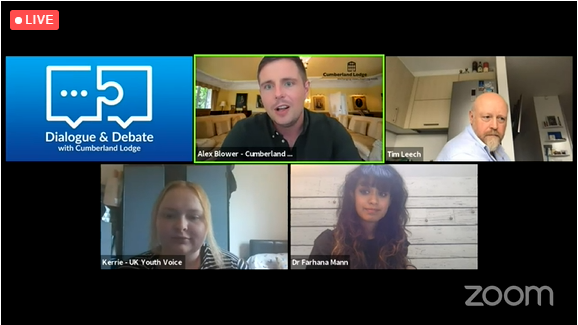The issue of ‘loneliness’ has been in the air for a long time, but discussions around it, and public awareness of it, have come to the forefront during the global coronavirus pandemic.
Across the UK, and around the world, people have been forced to put much of their social lives on hold while they have been isolating at home, and there is a shared feeling of uncertainty about the future amongst many young people.
The Dialogue & Debate webinar on ‘Youth & Loneliness’ took place on 12 August 2020, via Zoom, with three guest panellists:
- Tim Leech – Chief Executive of Wavelength, a charity that tackles loneliness through technology initiatives, and a former contributor to The National Loneliness Test with The Office of National Statistics
- Dr Farhana Mann – a psychiatrist and researcher in the Division of Psychiatry at University College London, who works on loneliness and its effects on people with or without existing mental health problems
- Kerrie Starkie – a representative of UK Youth Voice, which delivers youth services that focus on personal and social skills development.
The event was chaired by Cumberland Lodge Fellow, Alexander Blower.
A new but not-so-new topic
‘The journey to understanding of loneliness is in its infancy’, stated Tim Leech, one of the guests in this hour-long discussion online. Farhana Mann agreed and noted that multiple studies across populations reveal evidence that loneliness amongst young adults is not as easily recognisable as loneliness amongst older people. Most of the existing research on loneliness also focuses on older people. There is still a lot of work to be done to achieve the same level of understanding about how it affects people in younger age-groups. This dialogue highlighted the crucial importance of undertaking research aimed specifically at younger people.
The panellists talked about how loneliness can trigger serious mental health issues, so it should be looked at more seriously. ‘There should be a national approach to that’, said Tim. Farhana stressed the importance of dealing with loneliness and equipping young people with specific skills from an early age, instead of ‘dealing later on with consequences such as anxiety or depression’. Working with young people who are experiencing loneliness will also help future generations to better deal with loneliness.
Some “positive” outcomes of the global pandemic
The dialogue revealed two sides of the COVID-19 coin. Whilst the pandemic has obviously highlighted the potential for people to experience loneliness in their lives, the situation is actually more nuanced. Self-isolation measures have not led to a wholesale rise in loneliness.
It is common to confuse ‘loneliness’ with ‘isolation’, so when people are advised to self-isolate to stay safe, people expect loneliness to follow. However, Farhana explained that isolation is they physical state of not being surrounded by people, whereas loneliness is more of a state of mind, or how people perceive themselves. Some people can stay at home on their own and be absolutely fine, even enjoy it; others can be constantly surrounded by people, be married, have children and a wide circle of friends, but still feel lonely. The biggest factors in determining whether somebody will experience loneliness, regardless of lockdown requirements, are their personality type and whether they have the skills to deal with isolation.
Indeed, some people have benefited from the constraints of lockdown. Both Tim Leech and Kerrie Starkie noted that some people felt they suddenly had more social opportunities than they had previously had, because, ‘the world came to their houses, instead of waiting for them to come’.
In my experience, before the national COVID-19 lockdown, ‘real-life’ British events for young people (be it for socialising, entertainment or education) were concentrated in London and the south of England. Many people living in other areas of the country were had less opportunity to access them than they currently do, with so many events and activities moving online.
In order to cope with isolation and loneliness, some young adults started to develop new skills and try things they had never done before. A number of private and governmental institutions have used their resources to organise online events, via Zoom or similar platforms, to help reach those who have been experiencing loneliness.
The future of loneliness
The guests were talking about some current existing organisations, projects and initiatives developing this topic which positively showed that progress is being made in this direction. There is a hope that this work will continue, go deeper, and have a positive impact on society.
At the end of the discussion, the guests shared some practical advice for young people who might be experiencing loneliness right now, and drew their own pictures of how an ideal future world might look without loneliness.


